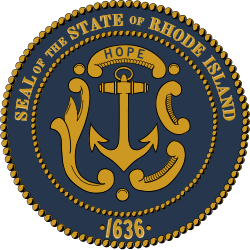General election
Following the resignation of Governor Philip Allen in order to become a United States senator on July 20, 1853, Lieutenant Governor Francis M. Dimond succeeded him and became the democratic nominee in the 1854 gubernatorial election so he could be elected to a full term. Meanwhile, the Whig party again nominated William W. Hoppin, who had sought the governorship before during the gubernatorial election of 1853, but had lost to incumbent governor Philip Allen. On election day, April 5, 1854, incumbent Democratic governor Francis M. Dimond was defeated by a margin of 2,693 votes against his Whig opponent William W. Hoppin, thereby losing democratic control over the office of governor to the Whig party. Hoppin was sworn in as the 24th governor of Rhode Island on May 2, 1854. [1]
This page is based on this
Wikipedia article Text is available under the
CC BY-SA 4.0 license; additional terms may apply.
Images, videos and audio are available under their respective licenses.



